
Chip Chan Kick!
Chip Chan Kick!
Platform: PC-FX
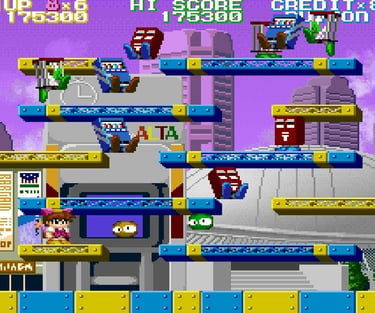

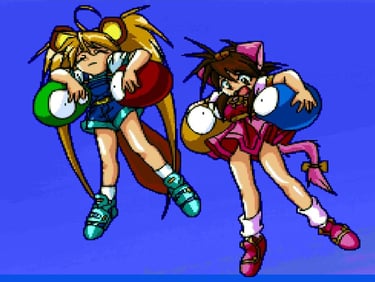

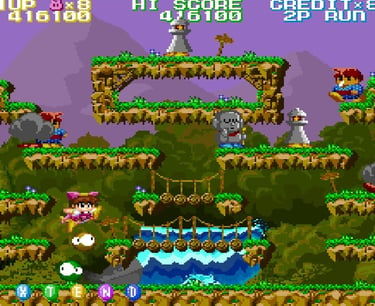

The single-screen platformer (SSP) was always an arcade phenomenon, its breezier (and quarter-stealing) proceedings perfect for quick, ephemeral amusement. For every Donkey Kong and Bubble Bobble that did come home, there were slews of other titles that never escaped the arcade. ‘Twas the home console that first truly embraced, and better explored, the promises brought by the scrolling screen.
All of which makes the home-exclusive Chip Chan Kick! an even more wonderful oddity—that such an unapologetically arcadey, sprite-based SSP would skip the coin-op for the living room was highly unusual for the time, especially when considering the mid-1990s' rampant 2D aversions. The PC-FX was another obstacle; as a notoriously underpowered piece of tech remembered more for its visual novels and dubious dating sims than anything action-centric, it seemed the last place for a quality SSP to land. That Kick! would be designed exclusively for any system, let alone this one—and even become a console-favorite at that—is equal parts shocker and godsend.
It’s also a distinct entry in the genre, focusing more on story and copious comedic hijinks than what would be practical for the arcade. Chip and Chap, so the story goes, are two young girls who inadvertently (and inexplicably) unseal the demon lord Walbit (and his bevy of sexy acolytes) while playing in a local park. The goddess Alina (Ariena) intervenes and, after decking the duo in a pair of magical cat and bear ears, commands them to recapture the runaway harem. It’s all conveyed in esoteric Japanese via a long opening cutscene, leaving the non-native speaker in a state of sheer incredulity. Not that it matters; translated or not, the story is all unapologetic nonsense reveling in its own winking absurdity.
That absurdity is realized splendidly, however; Kick!'s hand drawn art captures its curvy cast with undeniable panache…providing the vaguely pervy, subversive style of comedy so intrinsic to a certain breed of ‘90s anime. All character types--personality and body-wise--are represented here, mixing Chip and Chap’s pretense of innocence with the mature allure of the five femme fatales. In short, it’s a kid’s game meta-meant for the older folk who might not mind the occasional panty shot plopped before the platforming. The PC-FX was bought by the twenty-somethings after all, not the kiddies.
Fortunately, the jumping, not the strutting, is the true point here—remove the unnecessary full-motion intro and the interstitial story segments, and what’s left is a disarmingly charming, harmless hopper. Players move their squat protagonists across a colorful collage of stages—six areas composed of ten rounds apiece—tossing blobby-like spheres at an ever-changing gallery of baddies. Naturally, enemy elimination is the goal; a stunned foe can then be “kicked” into other enemies, bringing plenty of bonus points for every extra enemy claimed. In testimony to the game’s attentive art direction, the baddies change with their location, and the backgrounds are unique to every round. The water park, for instance, features attacking snorkels and inner tubes juxtaposed against an ever-snaking tangle of slides, while the zoo comes packed with penguins, miniature elephants, and similar pests all caught before backgrounds of scribbled, gawking animals. These rolling backdrops not only help with the immersion, but evoke a sense of adventure and progression that the average SSP often fails to properly convey. Indeed, if Kick’s in-game visuals barely reach its 16-bit ambitions, the varied artistry and skillful presentation easily compensate for the difference.
A boss bout concludes each area with one of the five vixens mounting a giant, mechanized beast that must be batted repeated with the heroines’ pudge balls before defeat is achieved. Here, narrative-wise, the game would have benefited from extra cinematics concluding each lady’s humorous comeuppance. But no, once felled, each gal is essentially dropped from the plot as the next girl is introduced. Likewise, the game’s finale is short and almost perfunctory, feeling strangely abbreviated when compared to the game’s opening animation and intervening scenes. Even Alina, the goddess in charge, is given only a few wistful seconds at the end.
The game is also a bit deceiving, for beneath the inspired voice work and anime spectacle is a decidedly straightforward, even mundane experience. Enemies, despite changing from area to area, generally boast the same behaviors—the same characters reskinned, essentially. Powerups are exceedingly predictable, offering increases in range and speed, invincibility, and a double-shot, but nothing inventive or remarkable. Stunned baddies tend to obnoxiously block attacks now meant for other nearby foes. It's not possible to jump down through platforms. And the heroines, despite being individually selectable at the start, play exactly the same, which seems like a missed opportunity.
Nevertheless, there isn’t a single-screen platformer quite like Chip Chan Kick!, a game that might be endearing for all the wrong reasons, but charms all the same. As a co-op experience, the game especially sings, easily surpassing the more “interactive” novels and sims that otherwise define the system. But even when divorced from its parent platform (thanks to emulation), the game still resonates as a late triumph for the genre. Had more single-screen platformers of the time tried blending traditional gameplay with the art smarts and high production values of anime-style storytelling, the genre might be more relevant today.
Chip Chan Kick! is a game of contradiction and quirky predilection. It seems made for young girls but appeals to older men. It’s a largely vanilla experience coupled with more spice and fervor that anything else in the genre. It’s a game which, by all accounts, should be forgotten just like the ill-fated console it was designed for. And yet, it keeps kicking. Continues to be remembered and recommended, cheered yet jeered, enjoyed for what it is and isn’t.
It’s weird. Maybe a touch inappropriate. Both a wanton comedy and, after the fact, an awkward apology. And because of this, or in spite of it…it’s a game that begs to be played.--D
Publisher: NEC Home Electronics
Developer: Marionette
Release: 1996
Genre: Single-screen Platformer
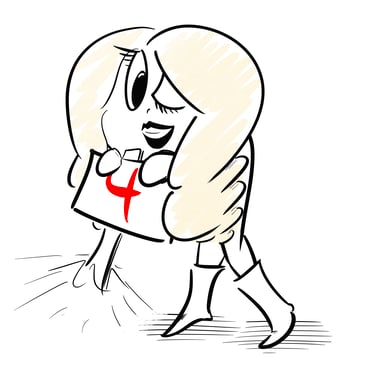

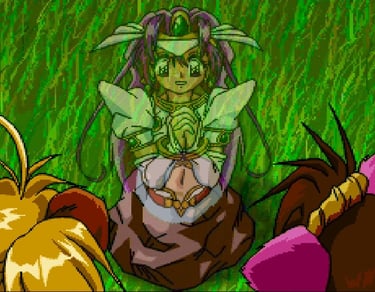

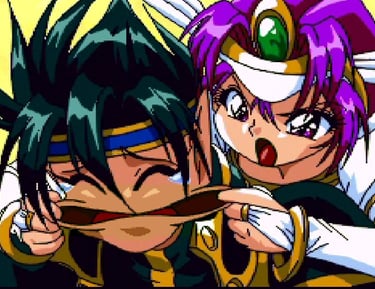

Top: Chap (no, not Chan) and Chip, now decked in animal ears and being carried away by their blob-buddies. Below: The villainous Walbit shares an interesting relationship with the Goddess...
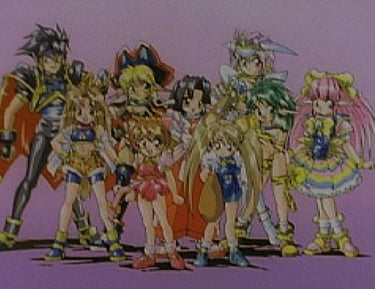

Top: The full cast posing within the opening FMV montage. Mid and Bottom: The Goddess Alina/Ariena, whose capricious personality provides some of the game's greatest laughs.
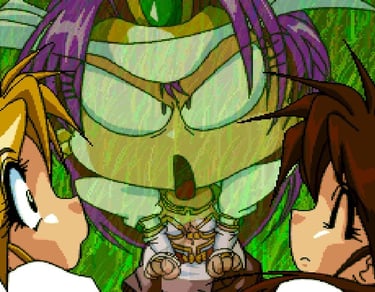

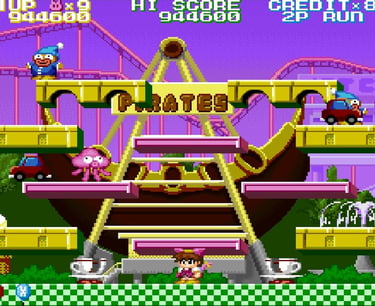

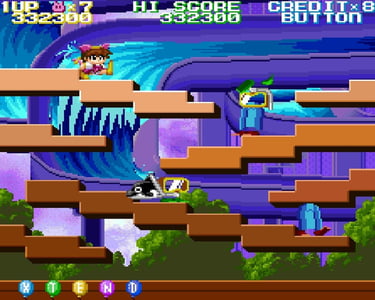

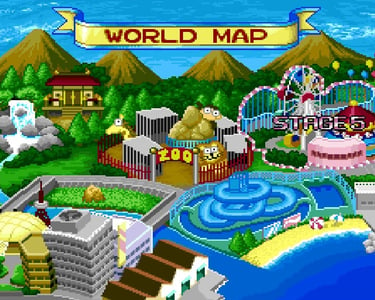

Here, Chip is kicking a snorkel and mask baddie into a walking blanket. The more enemies bowled over, the more points.
Despite the scads of Japanese dialogue, the game still sports a healthy amount of English as seen on the Map Screen.
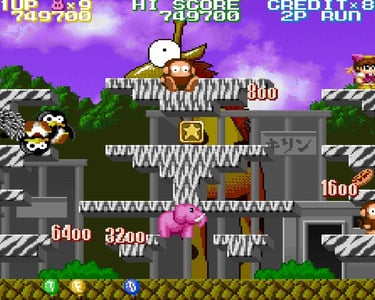

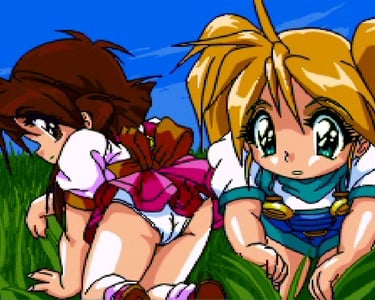

The girls' oblivious innocence can't quite breach the fourth wall.
The zoo sports some of the game's wackiest backgrounds.
Contact: lostnostalgiaproductions@gmail.com
Website: www.lostnostalgia.com
Like what we're doing? Please consider throwing us a dollar into our Patreon page's tip jar!


